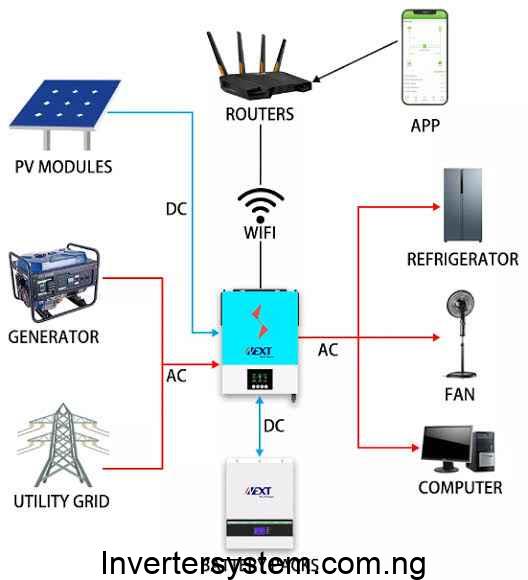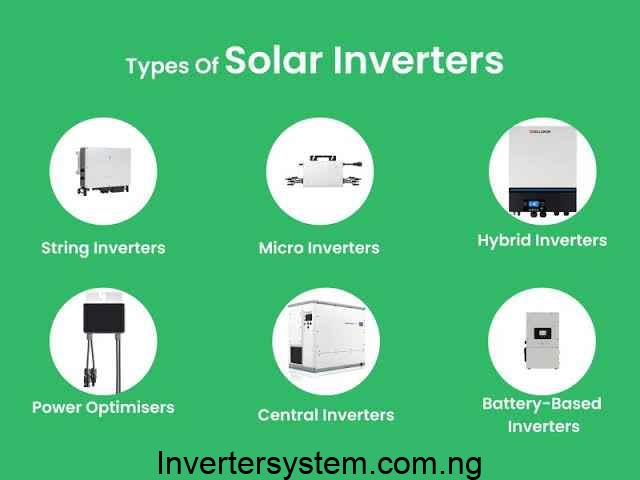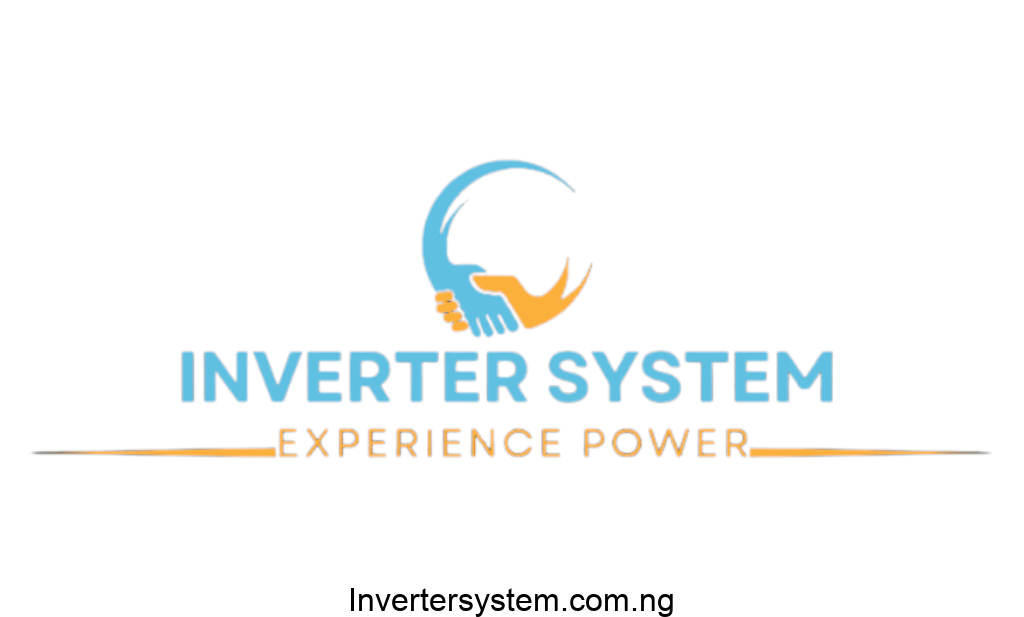Solar Inverters and Power Quality: Ensuring Consistent Energy Supply

When we think about solar energy, the panels often get the spotlight, but behind them lies a crucial component: the solar inverter. These devices are fundamental in converting solar energy into usable power, but their role extends beyond just conversion. Inverters help ensure the power quality of the energy generated, influencing how well that energy is delivered to both the user and the grid. Whether in an off-grid cabin or a bustling city, the quality of power supplied affects everything from appliance performance to the overall reliability of a home or business’s energy system.
But what happens when power quality falters? Voltage drops, frequency variations, and harmonic distortion are just a few of the issues that can disrupt an otherwise smooth energy flow. To avoid these, solar inverters must maintain a level of performance that ensures a consistent and high-quality energy supply. In this article, we’ll explore how inverters impact power quality, discuss the types of inverters available, tackle the challenges to power quality, and provide strategies for maintaining efficient energy systems.
Solar Inverters and Power Quality

What Are Solar Inverters?
Solar inverters are electrical devices that convert the direct current (DC) generated by solar panels into alternating current (AC). AC is the type of electricity used by most home appliances, machinery, and the power grid. Inverters act as the “middleman” between the solar panels and the rest of the system, ensuring that the energy generated is compatible with the grid or any off-grid appliances.
However, solar inverters don’t just convert power. They regulate the voltage and frequency of the output to meet the specific needs of the electrical grid. As solar power is inherently intermittent (depending on sunlight), inverters smooth out these fluctuations, ensuring a steady and reliable flow of energy. Without them, solar systems would struggle to meet grid standards for power quality.
What Is Power Quality in Renewable Energy?
Power quality refers to the characteristics of the electricity provided, such as voltage stability, frequency consistency, and the minimization of distortions in the electrical waveform. These factors directly impact the performance of connected devices. High-quality power is clean, steady, and free from fluctuations, while low-quality power might cause overheating, equipment malfunction, or inefficient energy consumption.
In the context of solar energy, maintaining power quality is paramount. The intermittency of sunlight creates inherent challenges, but solar inverters mitigate these challenges, ensuring that solar energy remains stable and usable. For users, the goal is not just generating electricity, but delivering it in a way that is compatible with household or industrial systems.
Why Consistent Energy Supply Matters
A consistent energy supply ensures that the electrical equipment functions as intended without interruption. For homeowners, reliable solar energy means reduced dependence on grid electricity, lower utility bills, and an uninterrupted power supply, especially during peak demand or power outages. For businesses, power quality is even more critical. Disruptions or poor power quality can lead to costly downtime, equipment damage, or loss of data, all of which have far-reaching financial consequences. Thus, ensuring high-quality, stable power through effective inverters is crucial for both residential and commercial users.
The Role of Solar Inverters in Power Quality Management

Inverter Performance and Reliability
The performance of solar inverters significantly impacts power quality. Inverters with high efficiency and low failure rates ensure that the generated solar energy is converted accurately and consistently. A high-quality inverter will handle voltage regulation, frequency control, and power factor correction to prevent disruptions in the power supply.
Reliability is also a critical factor. Solar systems can’t afford frequent inverter malfunctions, as this leads to system downtime and reduced efficiency. Over time, inverter wear and tear can affect performance, which is why choosing a durable, well-designed inverter is key to maintaining stable power.
Power Stability in Solar Systems
Solar inverters provide power stability by ensuring that energy output is consistent. Solar panels produce energy that fluctuates throughout the day based on the intensity of sunlight. A high-quality inverter smooths out these fluctuations and delivers a constant power output. Whether the sun is shining brightly or behind clouds, the inverter works to maintain a stable flow of energy, preventing sudden voltage drops or surges that could compromise the system.
Power stability is particularly important in grid-connected systems, where the solar system must sync with the grid. Any instability in the power being fed into the grid could cause blackouts or frequency imbalances, affecting not just the solar users but entire communities. Solar inverters ensure these challenges are mitigated, maintaining both system and grid stability.
Voltage Regulation in Solar Systems
Voltage regulation is another critical function of solar inverters. They regulate voltage levels to ensure that power supplied to the grid or household remains within a specified range. Voltage regulation ensures that the voltage stays at an optimal level, preventing spikes that could damage equipment or dips that could cause devices to malfunction.
In solar systems, voltage regulation is especially important during periods of low sunlight, when the solar output might be weaker. The inverter must boost the voltage to maintain consistency in the power supply. For off-grid systems, this is even more crucial, as the inverter becomes the primary tool for ensuring consistent energy.
Types of Solar Inverters and Their Impact on Power Quality

Grid-Tied Solar Inverters
Grid-tied inverters are commonly used in urban and suburban solar installations, where the system is connected to the local electrical grid. These inverters synchronize the solar energy output with the grid’s frequency and voltage, ensuring that solar power feeds smoothly into the grid. The key advantage of grid-tied systems is their ability to provide a constant supply of power while benefiting from the backup provided by the grid during periods of low sunlight.
Grid-tied inverters must meet stringent power quality standards to avoid disruptions in the broader electrical grid. Poor-quality power from a solar inverter could create power disturbances for other grid-connected users. Therefore, these inverters are designed with sophisticated features to ensure voltage and frequency stability.
Off-Grid Energy Solutions
Off-grid solar systems, used in remote locations, are entirely independent of the electrical grid. These systems rely on solar inverters to regulate power, store energy in batteries, and ensure stable voltage levels. Because they don’t have the grid as a backup, off-grid systems are more vulnerable to power quality issues. The inverter must be able to handle variations in solar generation and ensure that the load is properly managed.
Off-grid solar inverters also need to maintain battery health, ensuring that the energy stored in batteries is efficiently used when sunlight is unavailable. A failure in this system could leave users without power, underscoring the importance of high-quality inverter technology.
Hybrid Solar Inverters
Hybrid solar inverters combine the functions of both grid-tied and off-grid inverters. These systems allow users to draw from both the grid and batteries, providing ultimate flexibility. Hybrid inverters are ideal for homes or businesses looking to maximize energy independence while still benefiting from the grid when necessary.
The hybrid inverter is essential in maintaining a stable and high-quality power supply by seamlessly managing the transition between grid and battery power. Hybrid systems are increasingly popular due to their ability to store excess energy generated during the day for use at night or during power outages.
Factors Affecting Power Quality in Solar Inverters

Harmonic Distortion in Inverters
Harmonic distortion is a key factor in power quality. It occurs when there is a discrepancy between the expected voltage waveform and the actual output from the inverter. This distortion can cause inefficiencies and overheating, both in the solar inverter itself and in appliances connected to the system. Harmonics are most commonly introduced by low-quality inverters or by rapid changes in power output.
Inverters designed with advanced filtering techniques can minimize harmonic distortion and provide cleaner power to connected devices, improving overall system efficiency. Monitoring the level of harmonic distortion can also help prevent damage to equipment and ensure optimal inverter performance.
Voltage Fluctuations and Sags
Voltage fluctuations are another major concern in solar systems. These can be caused by several factors, including sudden changes in solar energy generation due to cloud cover or high energy demand. Inverters must detect these fluctuations and adjust their output to maintain a steady supply of energy. If not properly managed, voltage sags can result in the malfunction of connected equipment, while voltage surges can damage sensitive electronic devices.
By ensuring smooth voltage regulation, inverters help mitigate these issues, keeping both energy systems and appliances safe from power irregularities.
Energy Conversion Efficiency
Energy conversion efficiency directly affects both power quality and system performance. The more efficient an inverter is, the less energy is lost during the conversion process, resulting in a higher quality of power output. Inverters with higher conversion efficiencies also generate less heat, which improves both the long-term reliability and energy efficiency of solar power systems.
Challenges in Maintaining Power Quality with Solar Inverters

Common Solar Power Quality Issues
Solar systems are subject to several power quality issues, including voltage drops, frequency fluctuations, and transient surges that can arise from rapid changes in solar radiation or energy demand. These problems can disrupt the stability of a solar-powered system, affecting everything from home appliances to grid stability.
Integration with the Electrical Grid
Grid integration introduces another layer of complexity. The quality of power generated by solar systems must match the standards of the grid to ensure smooth integration. Any discrepancies can cause grid failures or damage to other equipment. To address this, inverters must use smart grid technology to communicate with the grid and adjust output as needed.
Reliability Concerns in Solar Energy Systems
Inverter reliability remains a top concern for solar users. Inverters are exposed to environmental factors, such as heat, humidity, and dust, which can degrade their performance over time. Frequent inverter failures can result in costly repairs, system downtime, and reduced overall efficiency. Therefore, ensuring that inverters are designed for longevity and equipped with advanced diagnostic features is essential for maintaining power quality and avoiding interruptions in energy supply.
A well-maintained inverter system will provide consistent energy and ensure the smooth operation of solar-powered appliances, making it essential for users to invest in high-quality equipment and schedule regular maintenance.
Solutions for Improving Power Quality in Solar Energy Systems

Power Quality Management Strategies
To manage power quality effectively in solar systems, several strategies can be implemented, such as:
- Load Balancing: Distributing electrical load evenly across the system helps maintain stable voltage levels. This prevents overloading any single part of the system, which could lead to inefficiency or power quality issues.
- Harmonic Filtering: Advanced inverters are designed with filters that reduce harmonic distortion, ensuring that the power delivered is as clean as possible. This minimizes the risk of damage to sensitive equipment and improves overall energy efficiency.
- Voltage Regulation: Inverters can also implement real-time voltage regulation. By adjusting output based on immediate energy needs and external factors like cloud cover or grid instability, inverters can help ensure the voltage remains stable even during unpredictable conditions.
When combined, these strategies ensure that solar power systems provide consistent, high-quality energy that meets or exceeds standards set by both the grid and the end-users.
Inverter Technology and Advancements
The solar inverter industry has evolved significantly over the years, and new advancements continue to emerge. Some of the latest technologies aimed at improving power quality include:
- Smart Inverters: These inverters come equipped with features like real-time monitoring, remote troubleshooting, and grid communication, which allow them to automatically adjust their output to optimize power quality. Smart inverters also provide feedback to grid operators, ensuring that solar-generated power is synchronized with grid demands.
- Multilevel Inverters: These inverters use a series of levels to convert DC to AC, providing smoother and more reliable power output. The increased levels reduce harmonic distortion and improve power quality by minimizing abrupt changes in voltage.
- Energy Storage Integration: Many modern inverters are designed to work seamlessly with energy storage solutions. By integrating batteries into the system, inverters can store excess solar energy generated during the day and supply it during periods of low sunlight. This not only helps improve the stability of the power supply but also ensures better voltage regulation and fewer interruptions.
By leveraging these technologies, solar users can improve both the efficiency and power quality of their energy systems.
Maintenance and Monitoring for Consistent Energy Supply
To ensure that solar inverters maintain optimal performance over time, regular maintenance is essential. Routine checks on the inverter, including cleaning, checking for damage, and ensuring the cooling system is functioning properly, can prevent issues that may arise from wear and tear.
In addition to physical maintenance, remote monitoring tools have become increasingly popular. These tools allow users to track their inverter’s performance in real time, receiving alerts if power quality or output falls below a specific threshold. This proactive monitoring can help detect issues early and minimize the risk of system failure. By ensuring the inverter is well-maintained and continuously monitored, users can achieve a stable and efficient energy supply, ultimately leading to greater system longevity.
Benefits of Ensuring High Power Quality in Solar Systems

Energy Efficiency Solutions
Ensuring high power quality not only stabilizes the energy supply but also contributes to energy efficiency. When power is clean and stable, appliances operate more efficiently, reducing unnecessary energy consumption. Solar inverters that maintain voltage stability and reduce harmonic distortion help users avoid wasted energy, leading to lower electricity bills and a more sustainable energy system.
Efficient systems also reduce the need for backup power sources or additional energy storage, cutting costs while still providing reliable power.
Extended Lifespan of Solar Energy Equipment
The lifespan of solar panels and inverters is heavily influenced by the quality of the power produced and the conditions under which the equipment operates. High-quality power means fewer surges, voltage drops, and other issues that could stress the system. Inverters that maintain clean, steady power prevent unnecessary wear and tear on solar panels, batteries, and other connected devices.
By investing in high-quality inverters and focusing on power quality, users can extend the life of their entire solar energy system, reducing the need for costly replacements and maximizing return on investment over time.
Improved Reliability of Renewable Energy Supply
High power quality ensures that solar energy systems remain a reliable alternative to traditional fossil fuels. Consistent energy output, reduced power interruptions, and efficient energy use contribute to a more dependable renewable energy supply. In areas prone to power outages or high energy costs, solar inverters that optimize power quality make solar energy a more attractive, long-term solution.
Moreover, reliable power quality encourages the adoption of solar energy by businesses and homeowners alike, furthering the transition to sustainable energy practices and reducing dependence on non-renewable sources.
Future of Solar Inverters and Power Quality

Trends in Clean Energy Technology
As the global demand for clean energy increases, innovations in solar inverter technology are expected to play a pivotal role in shaping the future of solar power systems. These advancements will likely focus on improving energy conversion efficiency, reducing harmonic distortion, and integrating with smart grid systems to allow for seamless transitions between solar and grid-based energy.
Solar inverters will continue to evolve with greater emphasis on automation, energy storage integration, and artificial intelligence, which will help optimize power generation, storage, and delivery. These innovations will make solar energy even more accessible, efficient, and reliable.
Impact of Smart Inverter Technology on Power Quality
Smart inverters will remain at the forefront of the solar industry. These inverters have the potential to revolutionize power quality by offering real-time data analysis, performance optimization, and seamless grid communication. They can automatically detect issues, adjust power output, and send diagnostic data to technicians, all of which will lead to improved energy stability and fewer disruptions.
Furthermore, as smart grid technology becomes more widespread, smart inverters will help solar energy systems integrate more effectively with the larger energy infrastructure, enabling dynamic response to grid fluctuations and enhancing power quality.
Growth of Renewable Energy and Power Quality Standards
As renewable energy adoption grows, so too will the need for standardized power quality benchmarks. Regulatory bodies are likely to introduce more stringent standards for inverters and solar systems, ensuring that solar-generated power meets the high-quality requirements necessary for both residential and commercial applications.
These standards will likely cover a range of factors, including voltage consistency, frequency regulation, and harmonic distortion limits, ensuring that all solar systems maintain a high level of power quality.
Conclusion
Solar inverters are not just converters of power; they are the guardians of power quality in renewable energy systems. By ensuring stable voltage, reducing distortion, and managing fluctuations, inverters make solar energy both viable and reliable. As renewable energy continues to grow, the importance of high-quality inverters that optimize power output and system performance cannot be overstated.
Now that you understand the relationship between solar inverters and power quality, consider investing in modern inverter technology that guarantees stable, high-quality power for your solar system. Whether you are building a new solar installation or upgrading an existing one, making the right choice now can save you time, money, and energy in the long run. Stay proactive with maintenance, embrace innovative technologies, and enjoy the benefits of clean, consistent energy.

![Interesting Impact of Solar Inverters on Property Value [2025] 10 The Connection Between Solar Panels and Property Value](https://invertersystem.com.ng/wp-content/uploads/2024/10/The-Connection-Between-Solar-Panels-and-Property-Value.jpeg?v=1728914299)



